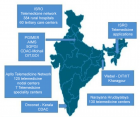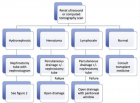Abstract
Case Report
Specific meningoencephalitis in patients with transplanted kidney
Mithat Tabakovic*, Senaid Trnacevic and Maida Dugonjic Taletovic
Published: 17 June, 2020 | Volume 4 - Issue 2 | Pages: 024-026
We described a case of specific (tuberculous) encephalitis in a patient after kidney transplantation. Immunosuppressive therapy, continuously required in post-tranplant period, may cause various complications, such as infections. Specific meningoencephalitis is an infection that is rarely diagnosed and more common in immunocompromised patients.
Case report: A 30-year-old man had kidney transplantation (kidney donor was his father). He previously was two years on chronic hemodialysis treatment because of end-stagerenal disease based on diabetic nephropathy. He has diabetes type 1. The early post-transplant period duly passed with satisfactory clinical and laboratory parameters of renal function. Two months after transplantation, he presented with febrile condition, signs of septicemia and dehydration with significant neurological deficit and expressed meningeal signs. In cerebrospinal fluid we found lymphocytosis, elevated proteins and positive micobacterium tuberculosis antibodies (Hexagon method) and we suspected to specific etiology of meningitis. Performed computed tomography (CT) scan of the brain with contrast confirmed the expected finding.
Due to the poor prognosis of infections of the central nervous system (CNS) in immunocompromised patients, only prompt diagnosis can improve survival in this group of patients. The therapeutic protocol after kidney transplantation include the prophylactic use of antituberculous drug (Isoniazid 300 mg) during the 9 months.
Read Full Article HTML DOI: 10.29328/journal.jcn.1001055 Cite this Article Read Full Article PDF
Keywords:
Meningoencephalitis; Diabetes mellitus; Kidney transplantation; Antituberculous drug; Immunosuppression
References
- Cohen J, Hopkin J, Kurtz J. Infectious complications after renal transplantation. In: Morris PJ (ed). Kidney Transplantation; Principles and Practice. WB Saunders Company, Philadelphia, London, New York, Toronto. 2002; 468-490.
- Živčić-Ćosić S, Trobonjača Z, Rački S. Imunosupresivno liječenje kod presađivanja bubrega. Medicina. 2010; 4: 413-23.
- Campbell PM. Pathology of acute rejection in the renal allograft. ASHI quaterly. Third quarter. New Jersey: ASHI. 2004: 86.
- Ležaić V, Radivojević D, Blagojević R, Đukanović LJ. Infection of central nervous system after kidney transplantation. Transplant Infect Dis 2002; 4: 167-168.
- Kidney Disease. Improving Global Outcomes (KDIGO) Transplant Work Group. KDIGO clinical practice guideline for the care of kidney transplant recipients. Am J Transplant. 2009; 9 (Suppl 3): S1-155. PubMed: https://pubmed.ncbi.nlm.nih.gov/19845597/
- Brennan DC, Bohl D. Infectious complications in renal transplant recipients. In: Malluche HH, Sawaya BP, Hakim RM, Sayegh MH (eds). Clinical nephrology, dialysis and transplantation. 2004; 1-34.
- Randhawa P, Brennan DC. BK virus infection in transplant recipients: An overview and update. Am J Transplant. 2006; 6: 2000-2005. PubMed: https://pubmed.ncbi.nlm.nih.gov/16771813
- Ležaić V, Radivojević R, Radosavljević R, Blagojević R, Simić S, et al. Does tuberculosis after kidney transplantation follows the trend of tuberculosis in general population? Renal Failure. 2001; 23: 97-106. PubMed: https://www.ncbi.nlm.nih.gov/pubmed/11256535
- Singh N, Paterson DL. Mycobacterium tuberculosis infection in solid organ transplant recipients: impact and implications for menagement. Clin Infect Dis. 2008; 27: 1266-1277.
- Morath C, Schmied B, Mehrabi A, Weitz J, Schmidt J, et al. Simultaneous pancreas-kidney transplantation in type 1 diabetes. Clin Transplant. 2009; 23 Suppl 21: 115-20. PubMed: https://www.ncbi.nlm.nih.gov/pubmed/19930324
- Joyce AT, Iacoviello JM, Nag S. End-stage renal disease-associated managed care costs among patients with and without diabetes. Diabetes Care. 2004; 27: 2829-2835. PubMed: https://www.ncbi.nlm.nih.gov/pubmed/15562193
Similar Articles
-
Equine Anti-Thymocyte Globulin (ATGAM) administration in patient with previous rabbit Anti-Thymocyte Globulin (Thymoglobulin) induced serum sickness: A case reportJoseph B Pryor*,Ali J Olyaei,Joseph B Lockridge,Douglas J Norman. Equine Anti-Thymocyte Globulin (ATGAM) administration in patient with previous rabbit Anti-Thymocyte Globulin (Thymoglobulin) induced serum sickness: A case report. . 2018 doi: 10.29328/journal.jcn.1001013; 2: 015-019
-
Urine Leak Following Kidney Transplantation: An Evidence-based Management PlanShafiq A Chughtai,Ajay Sharma,Ahmed Halawa*. Urine Leak Following Kidney Transplantation: An Evidence-based Management Plan. . 2018 doi: 10.29328/journal.jcn.1001018; 2: 044-052
-
Relationship between Fetuin-A and vascular or valvular calcification in hemodialysis patientsShahrzad Ossareh*,Bahareh Marghoob,Robabeh Bayat. Relationship between Fetuin-A and vascular or valvular calcification in hemodialysis patients. . 2019 doi: 10.29328/journal.jcn.1001021; 3: 001-011
-
Chronic Kidney Disease: A single day screening on World Kidney Day for five consecutive yearsRai Pradeep K*,Rai Punam,Bedi Sonam. Chronic Kidney Disease: A single day screening on World Kidney Day for five consecutive years. . 2019 doi: 10.29328/journal.jcn.1001025; 3: 046-054
-
The value of routine ultrasound at discharge to identify patients at risk of developing symptomatic lymphoceles after kidney transplantation: A case-cohort studyMaja Joosten,Paul P Poyck,Frank C d’Ancona,Wilbert A van der Meijden*. The value of routine ultrasound at discharge to identify patients at risk of developing symptomatic lymphoceles after kidney transplantation: A case-cohort study. . 2019 doi: 10.29328/journal.jcn.1001036; 3: 116-120
-
Specific meningoencephalitis in patients with transplanted kidneyMithat Tabakovic*,Senaid Trnacevic,Maida Dugonjic Taletovic. Specific meningoencephalitis in patients with transplanted kidney. . 2020 doi: 10.29328/journal.jcn.1001055; 4: 024-026
-
SGLT2 Inhibitors and nephroprotection in diabetic kidney disease: From mechanisms of action to the latest evidence in the literatureJorge Rico-Fontalvo,Rodrigo Daza-Arnedo,Maria Ximena Cardona-Blanco,Victor Leal-Martínez,Emilio Abuabara-Franco,Nehomar Pajaro-Galvis*,Jose Cabrales,José Correa,Manuel Cueto,Amable Duran,Alejandro Castellanos,Javier Enamorado,José Bohórquez,Isabella Uparella,Julio Zuñiga,Abraham Chagui,Alfonso Ramos,Luis Lara. SGLT2 Inhibitors and nephroprotection in diabetic kidney disease: From mechanisms of action to the latest evidence in the literature. . 2020 doi: 10.29328/journal.jcn.1001058; 4: 044-055
-
Acute kidney injury in Colombian patients with COVID-19 who received kidney support therapy with genius® 90 technologyEmilio Rey-Vela,Jesús Muñoz,Rodrigo Daza-Arnedo,Rodrigo Daza-Arnedo,Katherin Portela-Buelvas,Nehomar Pájaro-Galvis*,Víctor Leal-Martínez,Emilio Abuabara-Franco,José Cabrales-Juan,Leonardo Marín,Lucas Daza,Samuel Cuadro,Emir Ortiz,María Raad-Sarabia,Cesar Ferrer,Alejandra Prada,Greisy González,Elkin Mendoza,Klearly Tinoco,Jorge Camacho,Joel Ortega,Carlos Tobón,Juan Montes,Jorge Coronado,Luis Salgado-Montiel,José Correa,Fabio Salas,Amilkar Almanza-Hurtado,Miguel Aguilar-Schorborg. Acute kidney injury in Colombian patients with COVID-19 who received kidney support therapy with genius® 90 technology. . 2020 doi: 10.29328/journal.jcn.1001059; 4: 056-060
-
Collecting duct PGE2 responses reduce water loss with empagliflozin in mice with type 2 diabetes mellitusR Nasrallah,J Zimpelmann,V Cheff,JF Thibodeau,KD Burns,RL Hébert*. Collecting duct PGE2 responses reduce water loss with empagliflozin in mice with type 2 diabetes mellitus. . 2021 doi: 10.29328/journal.jcn.1001069; 5: 023-030
-
Impact of a multidisciplinary pre-dialysis program on renal treatment modalities choiceLuis Miguel Castro Fonseca dos Santos Oliveira*,Rui Arlindo dos Santos Alves de Castro,Teresa Margarida Ribeiro Pinto Morgado. Impact of a multidisciplinary pre-dialysis program on renal treatment modalities choice. . 2021 doi: 10.29328/journal.jcn.1001073; 5: 047-052
Recently Viewed
-
A Rare Case Report: Spinal Metastasis of Anaplastic Pleomorphic XanthoastrocytomaGizem Kavak,Mehmet Ali Nahit Şendur,Dilek Kösehan,Ayşen Aydin,Mehmet Ferat Kiran,Yildiz Güney*. A Rare Case Report: Spinal Metastasis of Anaplastic Pleomorphic Xanthoastrocytoma. J Radiol Oncol. 2025: doi: ; 9: 007-011
-
Fabrication and Optimization of Alginate Membranes for Improved Wastewater TreatmentJohn Sunday Uzochukwu,Nweke Chinenyenwa Nkeiruka*,Nwachukwu Josiah Odinaka,Olufemi Gideon Olajide. Fabrication and Optimization of Alginate Membranes for Improved Wastewater Treatment. Arch Case Rep. 2025: doi: ; 9: 026-043
-
PTM-Fetuin-A: A Novel Biomarker for Early Detection of Diabetic Kidney DiseaseBenkova M,Petrov P,Aleksandar Petrov*,Staykova S,Zlatanova E,Chervenkov T,Nikolova S. PTM-Fetuin-A: A Novel Biomarker for Early Detection of Diabetic Kidney Disease. J Clini Nephrol. 2025: doi: 10.29328/journal.jcn.1001146; 9: 013-019
-
In vitro, Anti-oxidant, and Anti-inflammatory Activity of Kalanchoe pinnataWijeratne Mudiyanselage Swarna Menu*. In vitro, Anti-oxidant, and Anti-inflammatory Activity of Kalanchoe pinnata. Arch Pharm Pharma Sci. 2025: doi: 10.29328/journal.apps.1001064; 9: 001-008
-
Nasal cytology in patients with previous SARS-CoV-2 infection: occurrence of atypical lymphocytesArturo Armone Caruso*, Anna Miglietta, Giovanni De Rossi, Liliana Nappi, Veronica Viola, Stefano De Rossi, Salvatore Del Prete, Clara Imperatore, Sabato Leo, Daniele Naviglio, Monica Gallo, Daniela Marasco, Lucia Grumetto. Nasal cytology in patients with previous SARS-CoV-2 infection: occurrence of atypical lymphocytes. Adv Treat ENT Disord. 2023: doi: 10.29328/journal.ated.1001014; 7: 001-006
Most Viewed
-
Evaluation of Biostimulants Based on Recovered Protein Hydrolysates from Animal By-products as Plant Growth EnhancersH Pérez-Aguilar*, M Lacruz-Asaro, F Arán-Ais. Evaluation of Biostimulants Based on Recovered Protein Hydrolysates from Animal By-products as Plant Growth Enhancers. J Plant Sci Phytopathol. 2023 doi: 10.29328/journal.jpsp.1001104; 7: 042-047
-
Sinonasal Myxoma Extending into the Orbit in a 4-Year Old: A Case PresentationJulian A Purrinos*, Ramzi Younis. Sinonasal Myxoma Extending into the Orbit in a 4-Year Old: A Case Presentation. Arch Case Rep. 2024 doi: 10.29328/journal.acr.1001099; 8: 075-077
-
Feasibility study of magnetic sensing for detecting single-neuron action potentialsDenis Tonini,Kai Wu,Renata Saha,Jian-Ping Wang*. Feasibility study of magnetic sensing for detecting single-neuron action potentials. Ann Biomed Sci Eng. 2022 doi: 10.29328/journal.abse.1001018; 6: 019-029
-
Pediatric Dysgerminoma: Unveiling a Rare Ovarian TumorFaten Limaiem*, Khalil Saffar, Ahmed Halouani. Pediatric Dysgerminoma: Unveiling a Rare Ovarian Tumor. Arch Case Rep. 2024 doi: 10.29328/journal.acr.1001087; 8: 010-013
-
Physical activity can change the physiological and psychological circumstances during COVID-19 pandemic: A narrative reviewKhashayar Maroufi*. Physical activity can change the physiological and psychological circumstances during COVID-19 pandemic: A narrative review. J Sports Med Ther. 2021 doi: 10.29328/journal.jsmt.1001051; 6: 001-007

HSPI: We're glad you're here. Please click "create a new Query" if you are a new visitor to our website and need further information from us.
If you are already a member of our network and need to keep track of any developments regarding a question you have already submitted, click "take me to my Query."

























































































































































